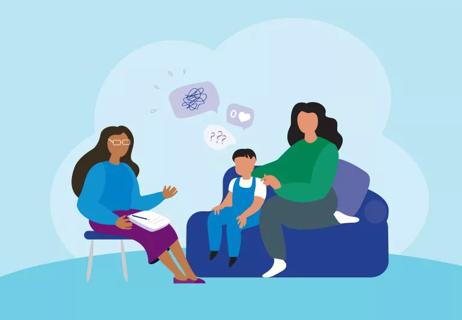Talk to a pediatrician if fears are constant, unreasonable

Everyone, including children, has bouts of anxiety once in a while. But when constant fears and anxieties disrupt your child’s day-to-day life, that’s a cause for concern.
Advertisement
Cleveland Clinic is a non-profit academic medical center. Advertising on our site helps support our mission. We do not endorse non-Cleveland Clinic products or services. Policy
Kids of all ages experience fears and worry. For example, your infant may cry when a stranger picks him up. Your toddler may have a fear of clowns or other people in costumes. An elementary school-aged child might complain of a stomachache on the first day at a new school.
These are all normal fears for children. But some children experience a much higher level of anxiety than others.
“The difference between normal anxiety and an actual anxiety disorder involves severity,” says psychologist Amy Lee, PhD. “Having fears and worrying is a natural reaction to stressful or new situations for children, but it’s when the anxiety grows out of proportion that it becomes a real problem.”
Normal childhood anxieties come and go, she says.
Loud noises, new people, new places and fearful experiences can elicit a fear-and-anxiety response from your child that’s quite normal.
Pre-teens and teens sometimes have performance-related anxieties. They may worry about upcoming exams or giving a presentation in front of the class. Older children are more likely to express their anxiety. When they cope with situational anxiety or stress, parents may find that offering support and encouragement helps a great deal.
Advertisement
However, for some children, these approaches just do not seem to help, and they may even bring about an opposite response of increased distress in the child. Pay attention to the effect your responses have on your child to gauge how effective or beneficial it is.
Kids prone to unhealthy anxiety have unrealistic fears. They may move from one area of worry to another as they get older, Dr. Lee says.
For example:
These fears are often crippling. They sometimes include extreme fear of insects, water, darkness, clowns, or just about anything else, Dr. Lee says.
Some children suffer from generalized anxiety disorder (GAD). Teens with GAD may focus their anxiety on performance-related fears that cannot be quelled by a parent’s reassurance and rational discussion. These worries can drive them to extreme study or practice habits or heroic attempts to avoid social situations.
Other children may have an intense fear that they will not or cannot satisfactorily meet the expectations of others and constantly seek reassurance in an attempt to dispel their fears. They may excessively ask questions like: Will we get there on time? Do you think I’ll get into a good college? What if I can’t fall asleep and it makes me too tired for the exam?
Unhealthy and consistently high levels of anxiety can lead your child to experience real physical repercussions, such as fatigue, stomach issues, headaches and even rashes. They may throw tantrums or devise other ploys to avoid things that trigger their distress.
Dr. Lee says that children with a true anxiety disorder exhibit a lasting and consistent pattern of significant disruptions of life activities.
In other words, their anxieties are far out of proportion to any real and significant danger.
Younger children who become overwhelmed with anxiety typically don’t realize they have exaggerated or unrealistic worries. Even teens may not know how to express their fears and verify with a parent or other trusted adult that their anxiety is out of proportion to reality.
Anxiety becomes a problem when it disrupts the child’s normal activities.
If your child gets so bogged down in worry and anxiety that he can’t attend sports practices, join clubs, or go on play dates that signals a problem.
Advertisement
“Take note if your child begins to have major emotional outbursts and comes up with various physical complaints to get out of his or her typical activities. If these continue over a period of time and truly disrupt the child’s life, intervention might be warranted,” she says.
When a psychologist or other qualified clinician treats a child’s chronic anxiety, the goal typically isn’t to eliminate the anxiety altogether, but to help your child manage it. “The psychologist will teach your child specific coping skills and likely use a cognitive behavioral therapy approach during therapy sessions,” Dr. Lee says. Some of the tools for coping skills your child will learn may include:
The clinician will typically also work with the entire family so everyone has specific skills to help the child learn to cope with anxiety triggers and assist them in using the tools learned in therapy.
Advertisement
“Although it depends on the individual child, it can take anywhere from six to 10 therapy sessions to see a positive benefit and many times medication, on a temporary basis, is helpful as well,” Dr. Lee says.
If you feel your child’s fears and worries are out of the ordinary or if bouts of anxiety are consistently disrupting your teen’s daily life, discuss your concerns with your pediatrician.
If the pediatrician agrees that intervention may help, he or she can refer you to an experienced child therapist or psychologist.
Advertisement
Learn more about our editorial process.
Advertisement

A glass child is the sibling of someone with special needs — often seen as the easy one, but carrying invisible burdens

Appetite changes, social isolation, repetitive behaviors and more may indicate that your child is struggling

Golden children often deal with perfectionism, low self-esteem and strained relationships as adults

Think of this behavior as a role reversal between parent and child — when a child takes on responsibility that’s not developmentally appropriate for their age

Tantrums and meltdowns are normal, but you can help your child manage their bigger emotions

American teens are facing unprecedented rates of depression and suicide, but you can be there to support and help them

Unexplained injuries, mood changes and sudden isolation may be signs your child needs help

Be involved in your kid’s care, but be mindful of boundaries

Wearing a scarf, adjusting your outdoor activities and following your asthma treatment plan can help limit breathing problems

Your diet in the weeks, days and hours ahead of your race can power you to the finish line

When someone guilt trips you, they’re using emotionally manipulative behavior to try to get you to act a certain way